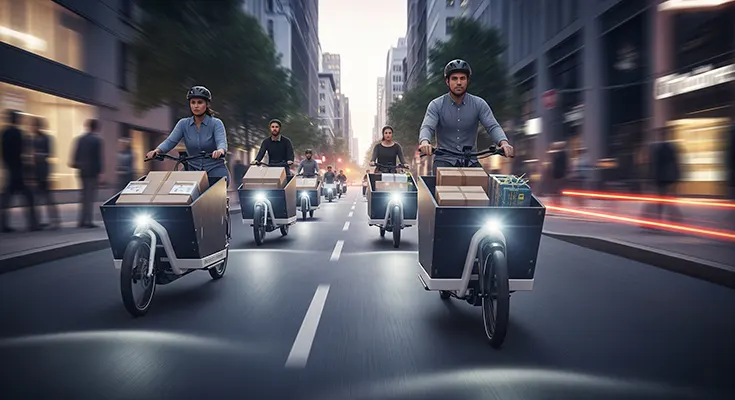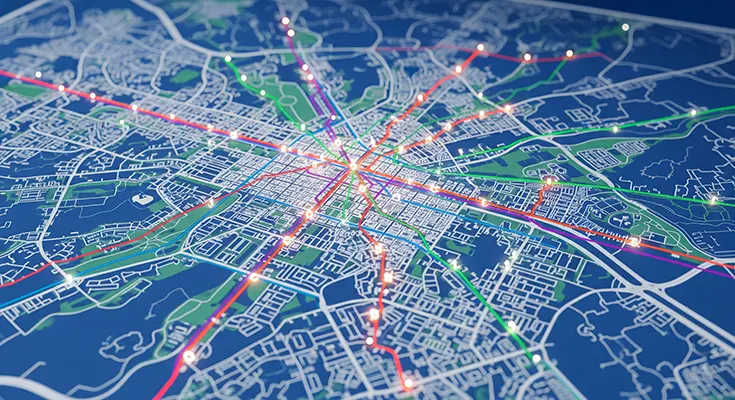The booming e-commerce sector has brought unprecedented convenience to consumers, but it has also exacerbated urban challenges: traffic congestion, air pollution, and noise. Traditional delivery vans, while efficient for bulk transport, often struggle in densely populated urban cores, leading to delays and environmental impact. Enter the electric cargo bike – a seemingly simple solution that is rapidly emerging as a transformative force in last-mile delivery, silently and sustainably navigating the complexities of modern cities.
The Urban Gauntlet: Why Traditional Methods Fall Short
The “last mile” – the final leg of a product’s journey from a distribution hub to the customer’s doorstep – is often the most expensive and inefficient part of the entire supply chain.
- Traffic and Congestion: Large delivery vans get stuck in traffic, struggle to find parking, and contribute to gridlock, especially in historic city centers with narrow streets and limited access.
- Emissions and Air Quality: Diesel and gasoline-powered vans are significant contributors to urban air pollution, a growing concern for city authorities and residents alike.
- Operating Costs: Fuel costs, parking fines, and vehicle maintenance add up for traditional delivery fleets, cutting into profit margins for logistics companies.
- Noise Pollution: The constant hum of engines and frequent stops and starts of vans contribute to urban noise, impacting residential areas.
The Electric Cargo Bike Advantage: Agile, Green, and Efficient
Electric cargo bikes (e-cargo bikes) directly address these challenges, offering a compelling alternative that is not just eco-friendly but also economically viable and highly efficient for urban logistics.
- Unmatched Agility and Speed: E-cargo bikes can weave through congested streets, use bike lanes, and often take shortcuts inaccessible to larger vehicles. They can deliver packages faster in many urban environments, sometimes even outperforming vans on speed for short to medium distances.
- Zero Emissions, Cleaner Air: Powered by electric motors, e-cargo bikes produce no tailpipe emissions, contributing directly to improved air quality and reduced carbon footprints. This aligns perfectly with cities’ sustainability goals and growing consumer demand for environmentally responsible delivery.
- Reduced Operating Costs: With lower “fuel” costs (electricity is significantly cheaper than gasoline or diesel), minimal maintenance, and no parking fees or congestion charges (in many cities), e-cargo bikes offer substantial operational savings.
- Quieter Operations: Their electric motors operate almost silently, reducing noise pollution in residential areas, especially during early morning or late-night deliveries.
- Increased Access: E-cargo bikes can access pedestrianized zones and areas with strict vehicle restrictions, expanding the delivery network and reaching customers that vans cannot. They also require less parking space, easing urban density.
- Scalability and Flexibility: Fleets of e-cargo bikes can be scaled up or down quickly, offering flexibility for peak demand periods without the capital expenditure associated with purchasing and maintaining a fleet of vans.
The Emerging Ecosystem: Technology and Innovation
The growth of e-cargo bike delivery is not just about the bikes themselves, but the supporting ecosystem.
- Improved Bike Design: Modern e-cargo bikes are purpose-built for commercial use, featuring robust designs, large cargo capacities (some capable of carrying hundreds of kilograms or multiple cubic meters), and advanced electric assist systems.
- Modular Cargo Solutions: Innovations in cargo box design allow for modular, interchangeable containers, making it easy to swap loads and cater to different types of deliveries, from food and groceries to parcels and even small appliances.
- Smart Logistics Software: Dedicated software platforms are optimizing routes for e-cargo bikes, managing fleets, and integrating with larger logistics networks, ensuring efficient scheduling and real-time tracking.
- Micro-Hubs: The rise of “micro-hubs” – small, strategically located urban depots – is critical. Goods are brought to these hubs by larger vans or trucks, then distributed for the last mile by e-cargo bikes, creating a seamless and efficient multi-modal system.
The Road Ahead: Challenges and Opportunities
While the future looks bright, challenges remain. These include securing adequate urban space for micro-hubs, ensuring rider safety in mixed traffic environments, and overcoming initial capital investment hurdles for businesses. However, with increasing public and private sector investment, evolving urban planning, and a clear demonstration of their effectiveness, electric cargo bikes are set to become an indispensable component of the smart, sustainable city’s delivery infrastructure. They represent a silent revolution, delivering not just packages, but a cleaner, quieter, and more efficient urban future.













